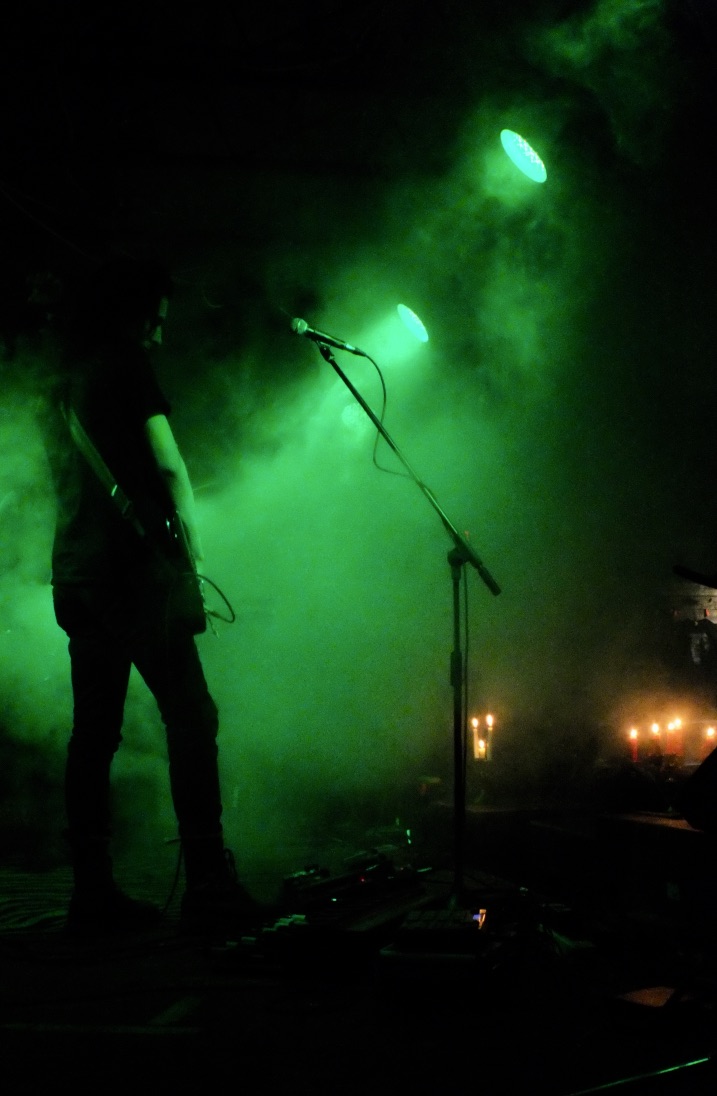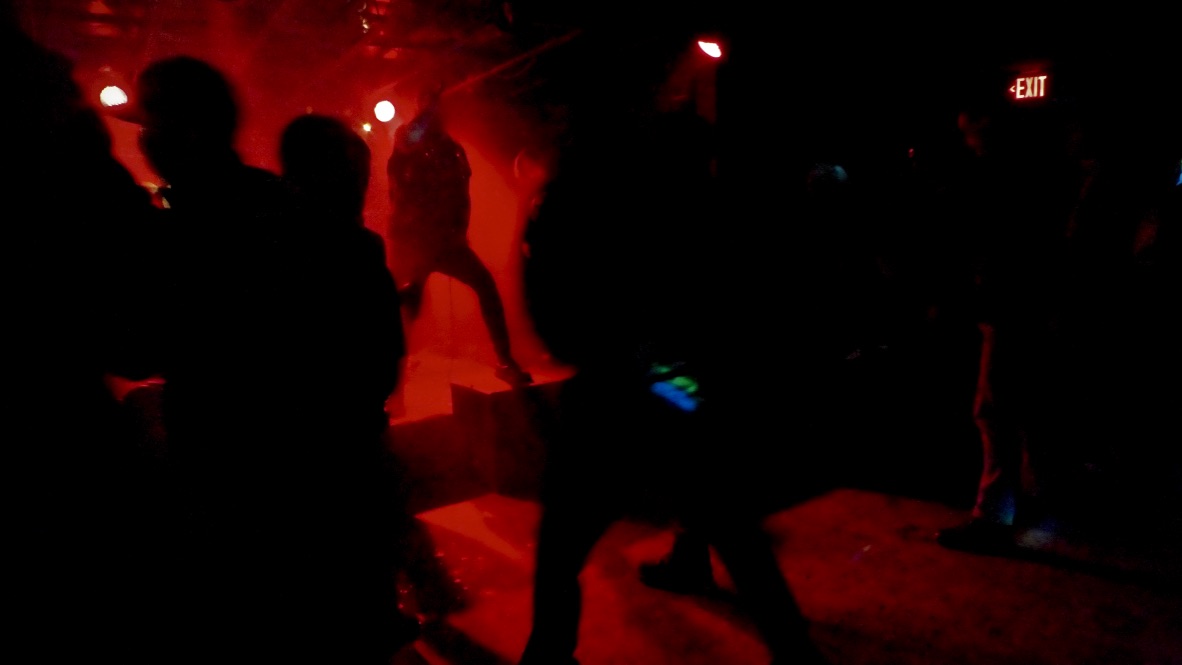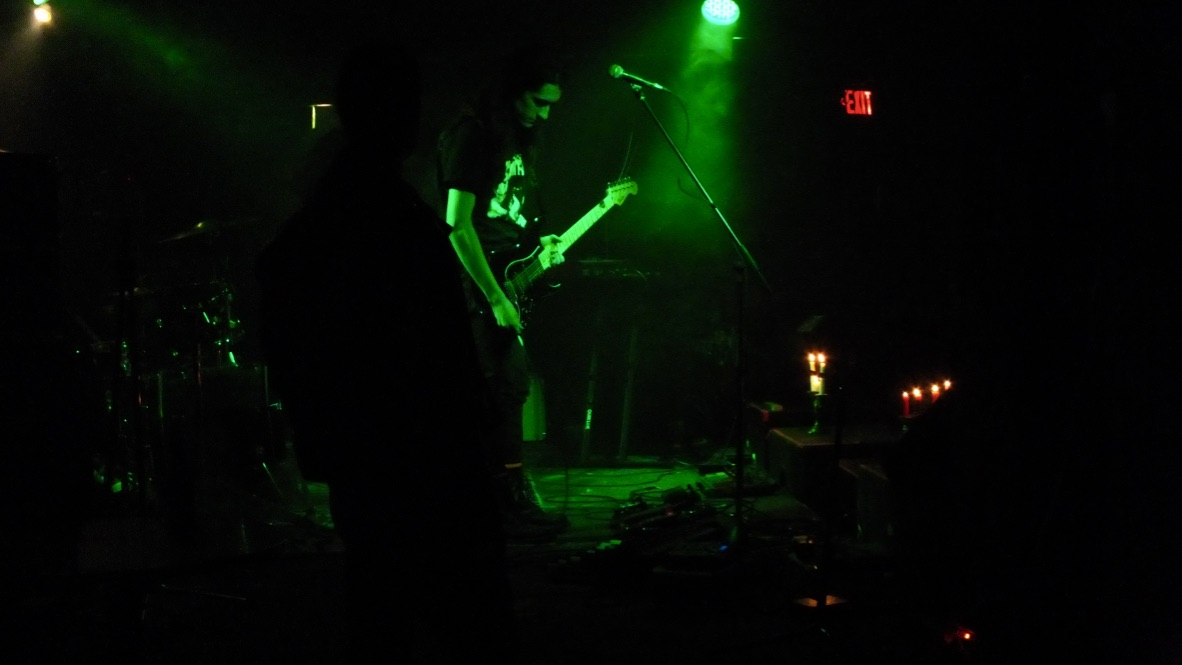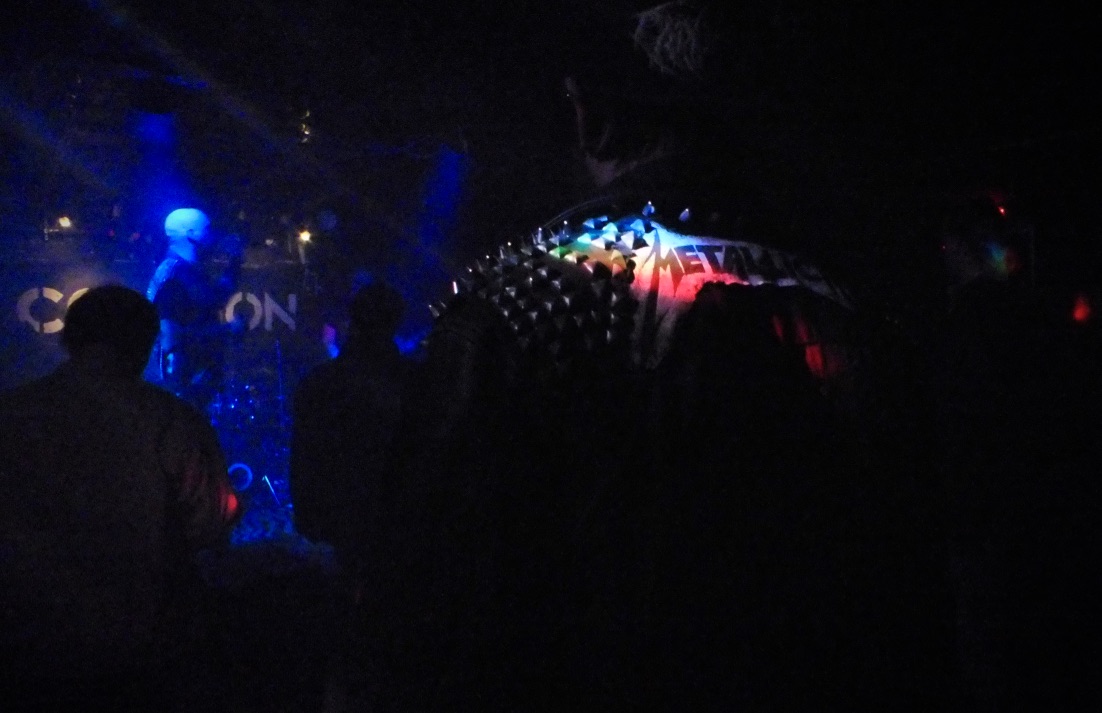Punk Is in Trouble in Toronto After Closing Of Last Dedicated Underground Venue
Credit to Author: Jack Denton| Date: Wed, 08 May 2019 12:44:12 +0000
Amid candles, thick fog, and palpable tension, Jake Ballah and his bandmates in Exes prepared to launch into their set of horror metal in front of a roomful of punks and metalheads. The group of young punks from Uxbridge, Ontario were opening the final show at Coalition, an iconic underground venue in Toronto’s Kensington Market.
It was an emotional evening for many people in the punk and metal scene, but far from being a pity party. After Exes’ set came hardcore band Murder Squad and 1980s-inspired Ammo—both of which had the crowd fiercely moshing. Sex Master headlined the night with an orgiastic set featuring a towering figure in a gimp mask and a whole lot of chocolate syrup getting thrown around.
Coalition’s landlords have refused to re-sign their lease, and it’s likely they’ll be looking for new tenants with a bit more polish than metalheads. Since its closure, Coalition has been searching for a new location, but there’s no word on where and when it might reopen. In the meantime, its absence highlights a massive lack of punk and metal venues in the city. The scene is at a watershed moment: the kids are alright, but a bit bummed—living the impacts of gentrification but desperately looking for the next basement to burn. A lack of venues is making it harder and harder for youth in and around Toronto to engage with the scene and is testing the resilience of a counterculture movement that ebbs and flows in popularity.
When it comes down to it, there’s an easy out in blaming gentrification, that Big Bad Wolf of urban culture, but to do so flippantly ignores the diverse pressures put on underground venues. “Rent prices are out of control” in the eclectic Kensington Market, says Coalition’s booking manager Matt Black, who notes some rents apparently climbing as high as $25,000 per month. “Do you know how much beer you have to sell? A lot of fucking beer.” There are also unique social forces that make operating an underground space difficult, and some of the closures in recent years have stemmed from an incongruity between the underground scene and strict bylaws or because of pesky neighbours.
In many ways, the very rise of dedicated punk venues in Toronto represented early gentrification in the city. “Punk rock moved in and there goes the neighborhood,” says Damian Abraham, frontman of the iconic Toronto hardcore punk band Fucked Up, and host of the podcast Turned Out A Punk as well as a number of VICE documentaries. Abraham says Who’s Emma, an anarchist community space, bookstore, and venue that operated in Kensington Market from 1996–2000, was influential in changing the area from an immigrant enclave into a thriving hub for arts and culture in Toronto. While Who’s Emma may have set the stage for a place like Coalition to thrive two decades later, ironically it’s also representative of the beginning of the wave of gentrification that contributed to Coalition’s end.
Coalition marks the latest in a laundry list of closures that have whittled down Toronto’s underground scene. For a number of years, Siesta Nouveaux was the centre of the scene, regularly holding all-ages shows until it was demolished in 2012 to make room for condos. S.H.I.B.G.Bs, an all-ages venue and DIY space, took up the mantle until its closure in 2015 after tensions with the city over noise complaints and concerns over a host of potential bylaw infractions. Soybomb, a beloved venue and DIY space famous for its skate ramp, closed in 2017. Facing sky-high costs of renovations needed to bring it up to code, vegan cafe and venue D-Beatstro shut down in 2018, as did multipurpose underground art and music space Double Double Land. FAITH/VOID, a DIY space, venue, and record store that was a keystone of the community closed in February of this year after noise complaints from new residential neighbours and the hefty fines associated with them.
Many of these places weren’t just punk and metal venues—they were dynamic, multipurpose spaces, gateways into the underground scene for young people and provided room and resources for this niche community to thrive. Beyond the music, the scene is also an objectively influential part of counterculture, and serves as a bellwether for social and political trends. The underground scene prides itself on being LGBTQ+ friendly, anti-racist, environmentally-conscious, and houses important spaces for community organizing. Toronto itself has a storied history of punk, from launching The Viletones and The ‘B’ Girls (Toronto’s first all-girl punk band) in the 1980s to, more recently, internationally renowned bands like Fucked Up, Career Suicide, Cancer Bats, S.H.I.T., PUP, and PKEW PKEW PKEW.

While the particulars of places like Coalition or FAITH/VOID are hyperlocal, understanding how they connect people and facilitate relationships is universal. In the same way that a community centre is much more than a basketball court or ice rink, those venues were inseparable from the fabric of Toronto underground.
The closures are especially poignant for young people, who make up the core of the scene and are at a point in their lives when engaging and growing with a community is crucial.
For 19-year-old Matt Grosz, the keyboard player in Exes, places like Coalition “are everything.” In a climate without venues dedicated to promoting a scene, it’s not just about booking shows—it’s about the survival of a strong community. “Even if you’re just a fan of the music, it gives kids a place to go,” Grosz says. This is all the more true for punk and metal, which have long been viewed as music for outsiders. “They can go to a show and see that, ‘Hey, there’s people like me who have the same interests that I have.’”
As Canada’s largest city, Toronto has a much more developed scene than many other cities and towns in southern Ontario. While other communities have small and important scenes in their own right, they often don’t have the population to support a thriving counterculture.
Michelle Ternapolski, 23, grew up near London, Ontario, where there was only a small community of metalheads. When she was coming of age, shows were relegated to basements or “random old people’s clubs.” But when Ternapolski moved to Toronto she “started to realize that it’s not just 40 or 50 people who like this music—it’s a whole community.”
Twenty-one-year-old Ballah echoes this sentiment, thinking back to his first experiences with the small punk and metal scene in his own hometown of Uxbridge, Ontario, population 21,000. Though there were some shows, he says, they could never play any of the bars because they were underage and “you couldn’t really mosh at the youth centre.”

Spaces like Coalition are so vital because they occupy a sweet spot between the truly underground house shows and mainstream music venues. “They’re definitely more accessible than an underground house show where you have to message a guy for an address,” Grosz says. On the other end of the spectrum, mainstream venues are sometimes not as receptive to independent bands who might not deliver the necessary capacity. Places like Coalition or FAITH/VOID were run by punks and metalheads, who connected to something that mainstream venue owners don’t get. “There’s such a barrier to entry for traditional venues,” Abraham says. “These places don’t have those barriers.”
Toronto’s punk and metal scene thrives in the zone between venues that are totally underground and those that are mainstream. Somewhere like Coalition or FAITH/VOID was big enough to be a worthwhile platform for bands coming out of house shows, but small enough to retain the community support and operate with a mandate for promoting underground culture. Without dedicated venues that bridge this gap, bands and fans in the scene alike may struggle with sustainability.
When Abraham began to get involved in Toronto punk around 1993, the scene was experiencing a drought of local venues, even as bands like Green Day were selling out Toronto’s bigger stages. “It was a hermit crab situation,” Abraham says. “Anywhere you could put on a show, you put on a show.” As the 1990s rolled on, punk’s mainstream success trickled down to the local level, and it was dedicated venues and community spaces like Who’s Emma that were instrumental in the success that Fucked Up and other bands enjoyed. “I think it would be a lot harder to do what Fucked Up did now,” Abraham says.
A large part of what’s required to sustain a scene fueled by young people is the availability of all-ages venues, but that often clashes with financial incentives for venues to sell booze. The price of a beer or two easily eclipses the $10 or pay-what-you-can cost to see the bands themselves, and shrugging off the 18-and-under kids may seem like no big deal to many places where alcohol sales are the primary money maker. Dedicated venues like Coalition understood and could navigate this environment.

“Even when we don’t advertise that we’re all ages, I tend to let underage kids in,” Black says, noting that young people are keen to get into spaces like Coalition to see local underground music. “I admire that, because that was me when I was 16.”
As with other business ventures, diversification is key. Successful spaces like D-Beatstro and FAITH/VOID could rely on a vegan cafe or record and merchandise sales to supplement income from shows. And while Abraham laughs at the notion of a business model at anarchist Who’s Emma—“I don’t think they ever saw anything close to a profit,” he says—that diverse space thrived with the help of volunteer efforts from young people in the scene.
A recent visible success story is See-Scape, a sci-fi themed bar, cafe, and venue in the gentrifying west-end Junction neighbourhood, which is thriving for now. Much of that, the owner Sara Nguyen says, stems from its highly-diversified business model, with bar offerings alongside board games and regular shows ranging from punk and metal to burlesque and magic. Nguyen was an active member of the Toronto underground scene in her late teens and early twenties. As a business owner and former punk, she understands the financial pressures facing landlords to increase rent prices, but is disappointed that they are making conscious decisions to not support the Toronto arts scene in favour of “becoming more corporate.” See-Scape smartly fills a niche and is located in a rent-friendly area, but that’s not possible for everyone.

Many people point out how this scene, like much else, is cyclical. Places open and places close, and that’s just the way it works. But it remains to be seen if downtown Toronto, with its sky-high rents and spreading gentrification, can support a dedicated punk or metal venue right now.
Greg Benedetto, the guitarist in S.H.I.T. and former owner of S.H.I.B.G.Bs, is one of the city’s top punk promoters through his booking agency Not Dead Yet. He says that, despite the lack of dedicated spaces, promoting in this climate is the same as it always has been. Not Dead Yet continues to book shows, though the annual, world-famous hardcore punk festival it has held every fall since 2010 won’t be happening this year.
Many are looking to the scene’s roots in a strong culture of DIY to pave the way forward. That’s the spirit behind house shows and loft parties, though those are never permanent solutions. “Try and build something your own,” Black says. “There’s always an opportunity for someone to put a show on in a basement or a garage.”
“Go anywhere,” Abraham implores. Fucked Up played raucous shows at the Jewish Community Centre in the early 2000s, and punks should never rule out asking restaurants or community centres to let them put on a show. “There’s all these doors you have to knock on, and you never know what place will be, like, fuck it, yeah, why not?”
Follow Jack Denton on Twitter.
Sign up for the VICE Canada Newsletter to get the best of VICE Canada delivered to your inbox.